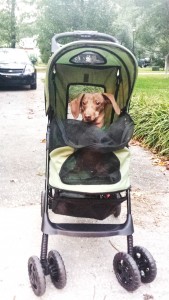We see lots of senior pets in practice. Here are a few pointers you can share with your clients!
1) Good Nutrition- all senior pets need a diet that is tailored to keeping them healthy. All foods are not created equal. You must talk to your veterinarian about which diet is best for your pet. For example, a dog with early kidney disease should be on a lower protein diet. A dog with constipation issues may need more fiber. Less active dogs may need a senior food with lower calorie content.
2) A Good Quality Bed- a nice supportive bed to lay on is beneficial to their joints and muscles as they age. While they may prefer to rest on the cool tile, having a bed available to them is important. Crib mattresses make great dog beds (they can't be soiled, they have plenty of room, and they have great orthopedic support)!
3) A Daily Walk- most dogs benefit from daily walks. Just to get out and stretch their legs and move around helps with mobility longer term. Nothing rigorous is necessary. Just getting out for a walk is good for body and mind and is special bonding time between dog and owner. Many senior pets will just sleep all day, so getting them up for that walk helps to keep them mobile. If your pet can't walk for some reason or tires quickly, consider taking them out for a "stroll" instead or when they get tired! If they are not used to going for walks, start small. A walk down to the end of the sidewalk or block may be a good place to start until you know their limits. Never go out when it is too hot. Older dogs overheat more easily and may exert themselves more.
4) A Weekly Massage- gently massaging your dogs legs and back muscles has many benefits. Increased blood flow, anti-inflammatory effects, endorphin release, and stimulation of the immune system are just a few of the benefits this can provide. Daily is great, but even once a week is helpful. Who doesn't love a massage?!
5) Joint Supplements- glucosamine is used to protect joint cartilage and helps to prevent progression of arthritis. Even though it may be difficult to see direct evidence of the benefit of joint supplements in some cases, it can help the joints and may help with longer term mobility.
6) Routine Grooming- Pets still need routine grooming and care as they age, and sometimes more often. When they are routinely groomed, they feel better. If it is too stressful to take them to the groomer, consider having the groomer come to you (mobile service).
7) First Dibs- If you have a senior pet, there is a good chance you may also have a younger dog in the house. While the youngster may try to be dominant, allow the older pet to get first dibs. Let them be first to have their food bowl put down, first to have their leash put on, first for their treat, etc.
8) Good Oral Care- as pets age, we tend to be more reluctant about upkeep on the teeth. Disease often starts in the mouth. Bacteria and chronic gingivitis are a bad combination and can lead to heart disease, kidney disease, or other systemic illness as the bacteria gets seeded into the bloodstream. Continue to have routine dentals as long as your pet is healthy and your veterinarian recommends doing so. Brushing, appropriate dental-friendly treats, and sometimes oral rinses can help in keeping the gums healthy.
9) Ramp for bed or couch, minimize stairs- We see a lot of injuries in the clinic of older dogs who jump off the bed or couch and cause serious injury to one of their legs or their back. Getting them used to some stairs or ramp up to these areas can be a great way for them to keep their independence and avoid injury. For arthritic dogs, use a baby gate to keep them from going up and down the stairs multiple times a day if you have stairs in your home.
10) Extra TLC- We all get busy in life. Take that extra few minutes when you can to really spend it with your pets. Look at them, talk to them, play with them, pet them. These may seem like obvious things, but in many households, things get hectic and time gets away. If a new pet comes into the household, make sure to give the same or more attention to your senior pet. Often when a new dog or puppy comes into the house, the older dogs get left out. Be aware and take extra care! We already know our pets don't live as long as we wish they would, so don't take that time with them for granted.


